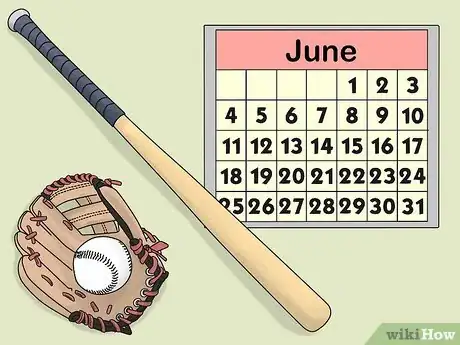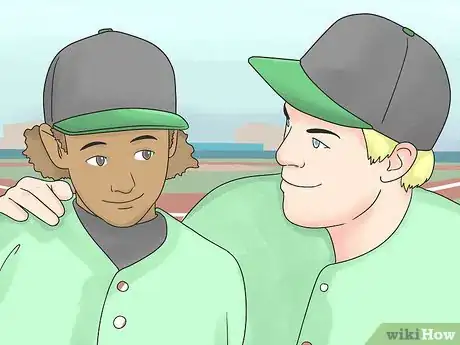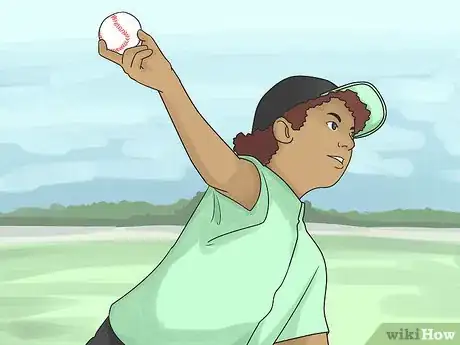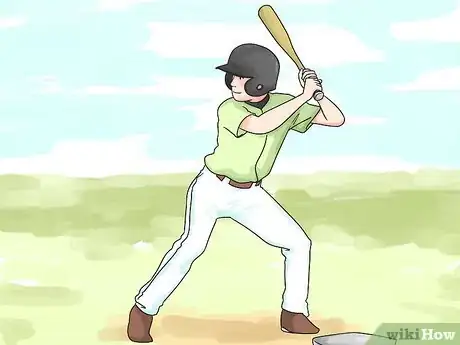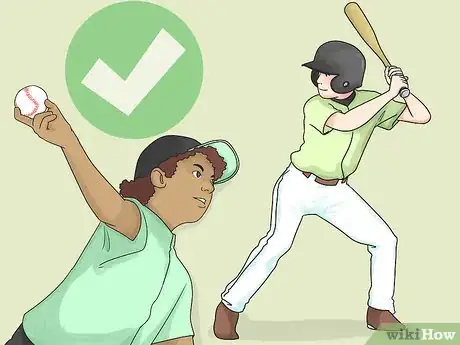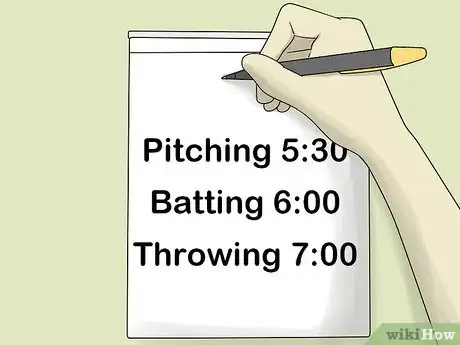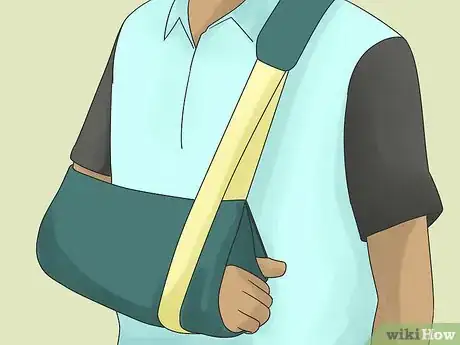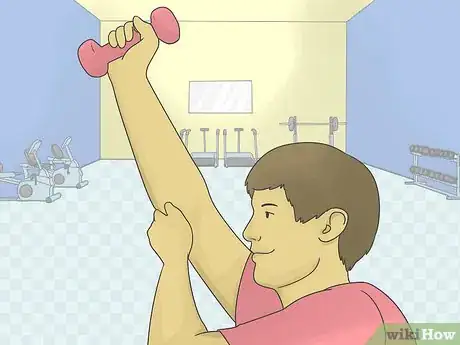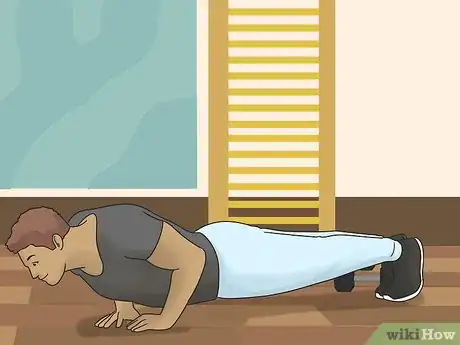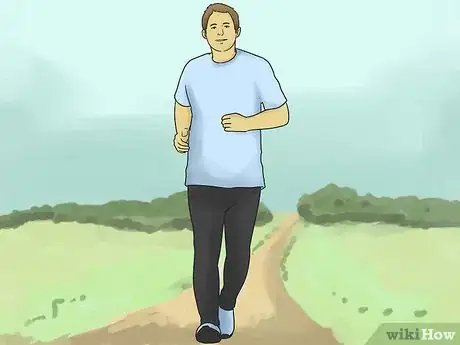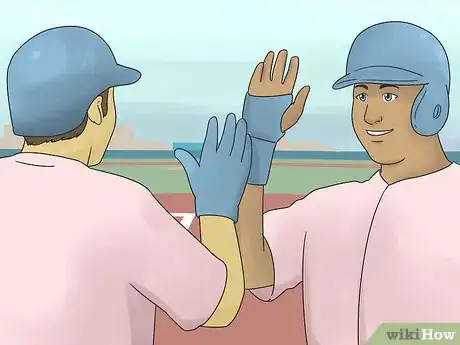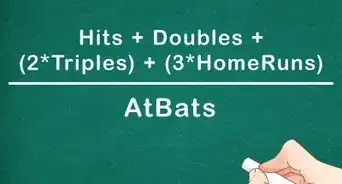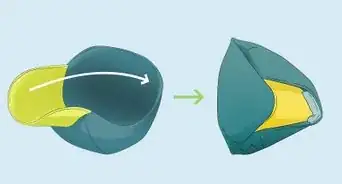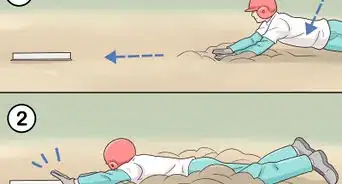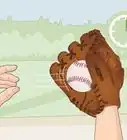This article was co-authored by Isaac Hess and by wikiHow staff writer, Christopher M. Osborne, PhD. Isaac Hess is a Baseball Coach, Instructor, and the Founder of MADE Baseball Development and Champion Mindset Training Program, a baseball training program based in Los Angeles, California. Isaac has over 14 years of experience coaching baseball and specializes in private lessons and tournaments. He has played baseball for both professional and collegiate leagues including Washington State University and the University of Arizona. Isaac was ranked as one of Baseball America's top 10 prospects for 2007 and 2008. He earned a BS in Regional Development from the University of Arizona in 2007.
There are 10 references cited in this article, which can be found at the bottom of the page.
This article has been viewed 62,601 times.
Whether it's your first year of trying out or your last chance to make the squad, you’ll give yourself the best chance to be on the school baseball team by impressing the coach with your conditioning, baseball skills, and attitude. Start as soon as possible in getting yourself physically and mentally ready to catch the coach’s eye at tryouts. If this is a goal you truly want to achieve, make sure you give it your best shot.
Steps
Becoming a Better Ballplayer
-
1Use the offseason to improve your game. Most U.S. school baseball seasons end around June. This gives you about nine months until tryouts in March. During this time, objectively evaluate your strengths and weaknesses. Asking your current coaches how you can improve is a good start, and will leave a good impression.[1]
- Try to get on a fall team in order to keep your skills sharp. Fall is a time to improve your game and work on things for the spring such as throwing a new pitch, bunting, hitting to the opposite field, etc.
- In the winter, if possible, work with a coach specifically to get better at fielding, hitting, and/or pitching.
-
2Work on specific parts of your game. Talk to the coach or another person whose opinion you trust about what areas need work. Focus your energies on improving those aspects of your game, while at the same time not ignoring your overall skill-building and conditioning regimen.[2]
- Becoming a better defender can help separate you from the pack. Work on positioning yourself properly, catching fly balls, scooping up grounders, and throwing on target.
- No matter how fast you are, working on your base running skills — like sliding and rounding the bases properly — will also pay dividends.[3]
Advertisement -
3Prioritize accuracy and command as a pitcher. For pitchers, control is more important than velocity. Work on the hitting the strike zone first, then work on velocity. Remember that velocity is enhanced by proper mechanics, which also benefit control.[4]
- During the offseason, focus on developing a smooth, repeatable delivery and accuracy in your pitches. Don’t wear out your arm by trying to hurt your catcher’s hand.
-
4Work on your bat speed and plate discipline. Bat speed is essential to making the ball go far. Sensible strength training can help increase bat speed, but proper form and technique are at least as important. Work with a hitting coach or look on the internet for drills to improve your swing.[5]
- Take batting practice regularly, from a machine or — even better — a live pitcher. Work on your plate discipline, so you can quickly differentiate a good pitch to hit from a ball off the plate.
-
5Show your versatility as a ballplayer. School baseball teams often have limited rosters, so you’ll better your odds of making the team if you can play multiple positions and fill multiple roles. Even if you prefer the infield, work on your outfield skills as well. Practice bunting and base-stealing so you can be used as a pinch hitter or pinch runner. And teams can almost always use another catcher, since many players shy away from this physically and mentally demanding position.[6]
Doing Offseason Conditioning
-
1Create a training schedule. The more you practice, the better you get, and you can practice some aspect of baseball every day. Make a weekly schedule that includes conditioning as well as working on skills. Following a regular routine will make it easier.[7]
- Consider alternating days between specific baseball skills (throwing, batting practice, fielding drills, etc.) and targeted conditioning exercises (interval workouts, running drills, etc.). This might prevent a sore throwing arm or calloused hands (from swinging a bat too many times), and can also reduce potential boredom.
-
2Rest injured or sore muscles and joints. If you've had a long season or an injury, it is important to take some time to recover. Repetitive motion injuries are common among serious athletes. Even if you have to alter your offseason program, give yourself time to rest and recover. You definitely won’t make the team if you’re still injured during tryouts.
- If you have a “dead arm,” for instance, running cross country and/or doing a sprint training program can help keep you in shape while giving your arm a rest.
-
3Condition your arm in time for tryouts. So long as you’re not dealing with soreness or injury, incrementally build up your arm strength and stamina during the offseason. Start early (at the beginning of winter, for instance) and work slowly so you don’t have a sore arm or blisters interfering with your tryout.[8]
- Look for arm strength training programs online, or even better, talk to a knowledgeable coach or trainer. The program should focus specific exercises on specific areas — like the wrist, elbow, shoulder, hips, legs, etc. — and typically culminate with long-toss exercises.[9]
-
4Build strength in baseball-friendly ways. Most baseball coaches used to advise against weight training, and even today some are not big proponents of it. Talk to the coach about their views on strength training and the type of workouts they prefer their players to do. Remember, it’s never too early to get on the coach’s good side.[10]
- In many cases, basic exercises like push-ups, pull-ups, and working with a medicine ball may make up the backbone of your strength training program. If you do choose (or are advised) to do weight training, lift safely and sensibly and give yourself adequate rest between workouts.[11]
-
5Use cardio to complement sprints and interval training. Baseball is largely an anaerobic activity — that is, it requires short bursts of energy as opposed to aerobic endurance. So, while distance running is good for your health and may help loosen up a stiff arm (and all your other joints), focus primarily on short-burst workouts.
- Talk to a trainer or coach, or look online for a sensible workout plan that incorporates sprints, interval training, and other exercises that involve bursts of energy.
-
6Work on running faster. You might hear baseball coaches say “you can’t teach speed,” but you can in fact train to make yourself at least a little faster. Sprint and interval training sessions can help, along with improving your running form and technique.[12]
- Make sure to incorporate sport-specific drills into your program — in this case, base running drills, for instance. Being a faster runner won’t help you much if you’re still a subpar baserunner.[13]
-
7Eat and sleep properly. Eating healthy — lean proteins, fruits, vegetables, whole grains and a minimum of processed carbohydrates and sugars — will make a difference over time. The appropriate intake for your activity level is also important. This may mean eating five small meals a day instead of three larger ones. Consult with your doctor or a trainer or dietician to find the best diet for you.[14]
- Don’t forget that you need to sleep well also. Getting the right amount of sleep will give you more energy and focus, and reduce recovery times. As a teen, aim for at least eight hours per night.[15]
Making the Right Impression
-
1Learn what you can about the coach and the baseball program. Especially if the coach has been there for a while, the school baseball program probably has an ingrained culture — that is to say, “the way things are done here.” Talk to current and former players, and others with knowledge of the program. Learn the “do’s” and “don’t’s” before tryouts begin.[16]
- Go right to the source and talk to the coach as well. They will likely be more than happy to discuss their expectations and preferences for their team and players.
-
2Get on the coach's good side. A school baseball coach looks for more than just skills. Show good sportsmanship, get good grades, and present yourself as a good kid. This can give you the edge over another player. Don't play around during practice or act like a goof. Be serious and try to improve every day.[17]
-
3Display humility. There are sure to be some exceptional ballplayers at tryouts, so when you get out there don't be too cocky or overconfident. If it's an open tryout, stretch and run on your own. Find someone else to throw with. Take it seriously and follow the coach's instructions fully.[18]
- Follow the rules, take instruction willingly, and don’t grumble, complain, or bad-mouth other players.
-
4Accept failures and move on from them. Baseball is a tough sport in which failure is an integral part; even the best hitters get out more often than they get hits. When you do come up short during tryouts, it is important to show the right attitude. Be confident yet polite. Keep your head up, look your coach in the eye, and don't look down at your feet when you do make that inevitable error or mistake.[19]
- If you fail to make the team this year, leave a positive impression on the coach with your effort and attitude. They’ll remember it — and you — when next year rolls around.
-
5Give it your best and never quit. There is no fool-proof way to make a school baseball team; even a player with superior skills might not make the cut due to a bad attitude or poor grades. Conditioning and training can improve your talents only so much, but you have total control over your effort level and determination. If you know you’ve given it your best shot, you can — and should — be proud of yourself regardless of the result.
Community Q&A
-
QuestionWhat do I need to have to succeed at baseball?
 Isaac HessIsaac Hess is a Baseball Coach, Instructor, and the Founder of MADE Baseball Development and Champion Mindset Training Program, a baseball training program based in Los Angeles, California. Isaac has over 14 years of experience coaching baseball and specializes in private lessons and tournaments. He has played baseball for both professional and collegiate leagues including Washington State University and the University of Arizona. Isaac was ranked as one of Baseball America's top 10 prospects for 2007 and 2008. He earned a BS in Regional Development from the University of Arizona in 2007.
Isaac HessIsaac Hess is a Baseball Coach, Instructor, and the Founder of MADE Baseball Development and Champion Mindset Training Program, a baseball training program based in Los Angeles, California. Isaac has over 14 years of experience coaching baseball and specializes in private lessons and tournaments. He has played baseball for both professional and collegiate leagues including Washington State University and the University of Arizona. Isaac was ranked as one of Baseball America's top 10 prospects for 2007 and 2008. He earned a BS in Regional Development from the University of Arizona in 2007.
Baseball Coach & Instructor There's a lot of failure in baseball, so resilience and a positive attitude are extremely important. It's also important to be coachable, have a competitive spirit, and a desire to do your best. So long as you're prepared to learn and willing to take risks, you can succeed in the sport.
There's a lot of failure in baseball, so resilience and a positive attitude are extremely important. It's also important to be coachable, have a competitive spirit, and a desire to do your best. So long as you're prepared to learn and willing to take risks, you can succeed in the sport. -
QuestionI don't think I'm going to make it. What should I do?
 DonaganTop AnswererThere's no alternative to practicing. Nobody was born being a good player. They just practiced. Some people have to practice more than others. Practice until you make it.
DonaganTop AnswererThere's no alternative to practicing. Nobody was born being a good player. They just practiced. Some people have to practice more than others. Practice until you make it. -
QuestionWhy so serious?
 DonaganTop AnswererIt's true that baseball -- like any game -- is supposed to be fun. But if you want to be a really good player, you have to take the game seriously. That's true of anything you do. If you don't especially care about being good, then no problem! Just have fun.
DonaganTop AnswererIt's true that baseball -- like any game -- is supposed to be fun. But if you want to be a really good player, you have to take the game seriously. That's true of anything you do. If you don't especially care about being good, then no problem! Just have fun.
Warnings
- Consult your doctor before playing baseball. School programs usually require signed proof of a physical exam by a doctor, so have one scheduled.⧼thumbs_response⧽
References
- ↑ Isaac Hess. Baseball Coach & Instructor. Expert Interview. 20 March 2020.
- ↑ http://www.hsbaseballweb.com/make_the_team.htm
- ↑ https://howtheyplay.com/team-sports/How-To-Make-Your-Varsity-High-School-Baseball-Team
- ↑ http://www.hsbaseballweb.com/make_the_team.htm
- ↑ Isaac Hess. Baseball Coach & Instructor. Expert Interview. 20 March 2020.
- ↑ https://howtheyplay.com/team-sports/How-To-Make-Your-Varsity-High-School-Baseball-Team
- ↑ https://howtheyplay.com/team-sports/How-To-Make-Your-Varsity-High-School-Baseball-Team
- ↑ Isaac Hess. Baseball Coach & Instructor. Expert Interview. 20 March 2020.
- ↑ http://www.active.com/baseball/articles/youth-baseball-tips-for-developing-arm-strength-878652
- ↑ https://howtheyplay.com/team-sports/How-To-Make-Your-Varsity-High-School-Baseball-Team
- ↑ http://www.active.com/baseball/articles/offseason-training-the-right-way-878317
- ↑ https://howtheyplay.com/team-sports/How-To-Make-Your-Varsity-High-School-Baseball-Team
- ↑ http://www.stack.com/a/baseball-conditioning
- ↑ http://kidshealth.org/en/teens/eatnrun.html
- ↑ http://sleepcenter.ucla.edu/sleep-and-teens
- ↑ https://howtheyplay.com/team-sports/How-To-Make-Your-Varsity-High-School-Baseball-Team
- ↑ Isaac Hess. Baseball Coach & Instructor. Expert Interview. 20 March 2020.
- ↑ https://howtheyplay.com/team-sports/Tips-For-Baseball-Tryouts-What-Coaches-Are-Really-Looking-For
- ↑ http://www.hsbaseballweb.com/checklist.htm
